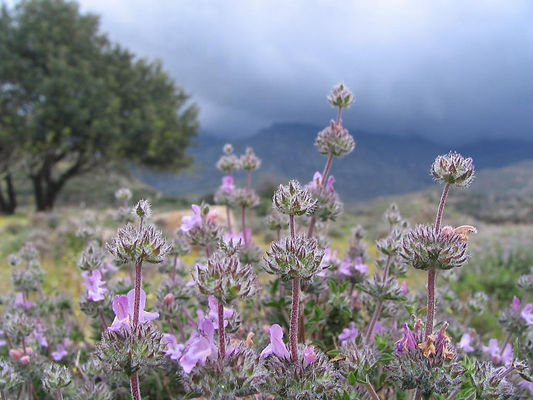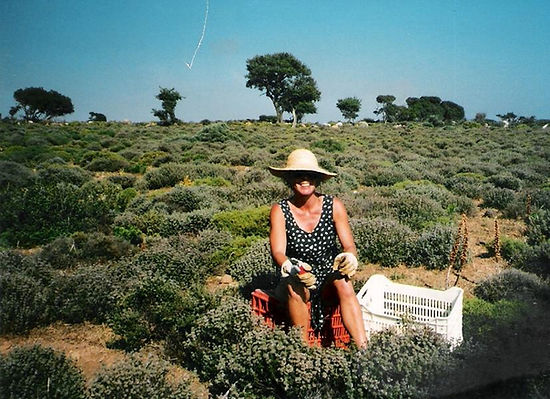Why Wildcrafting?

In cultivation each plant is sown the same time, has an already limited lifespan and is raised according to human needs. Peppermint oil production in the US is an example here. It is economically more interesting to harvest the plant material of this perennial plant completely every year, use it like an annual. Big mowing machines harvest the fields day and night, throw the plant material in containers which go straight to the distillery. Next machine comes, digs up the roots, cuts them in pieces and they are then planted again for next years crop. Genetically uniform. Standardized oil. Just one example. Lavander harvest in France- large monocultured fields with uniform plant size to facilitate harvesting machines to mow the entire field. Plants exploited and helpless in their determined fate. Turned into annuals. Whereas most garden vegetables have an annual life cycle, most aromatic plants are perennials and can reach an impressive age, if left to express their nature freely in their natural environment.
We chose to collect and distill exclusively aromatic plants which are wild growing. We feel, that in relation to aromatic and medicinal plants, wild individuals and populations are of a clear advantage.
We appreciate and cherish that the plants had a chance to live their own life as much as possible according to their 'original instructions' as the American Indians would say, that we respect that nature is wonderful and not just exploit it for our own needs, regardless of their beings.
We try to do our best to work and live with a holistic approach, a living, dynamic and all-embracing approach both to human- but also to plant nature.
Then there is something special about essential, etherical oils, which somehow relates to the spirit, the spiritual energy as well. Spiritual energy is strongest in free and healthy plants, which are allowed to express their individuality just like it is in us human beings.
Another reason for us to prefer wild crafted plants is that they can be called population oils as well. A plant population comprises of all kinds of individuals, old ones, young ones, slender ones, fatter ones, tougher ones, each one expressing an individuality in the community. Even though some plants produce 100, 1000 or even millions of seeds, only a few survive- thats natures rule, and since only a few survive, this ensures genetic diversity and strength in a population, where we find all kinds of individuals each contributing with their own age, experience and life-force.


Collecting wild plants means to take care of these populations, harvest only as much as each plant can take, ensure its survival. Leave enough flowers or leaves, parts of root so that the plant can survive and grow, allowing you to come back the next season and harvest.
Wild plants are harvested by hand- there is no noise of machines, there is the communication between collector and plant, there are bees competing. Anyone who ever read Thompkins and Birds 'The Secret Life of Plants',exciting reading again and again, will understand the point. Plants do have reactions to situations.



Last, but certainly not least, it is an enormous pleasure to collect the plants out there in their natural habitats. Setting of, equipped with your scissor and a few boxes into the wild, being in close communication with the plants, its quiet around, just the bees and birds are heard..We usually set off together, but very soon each one goes his/her own way, as the plants call you, from one to the other. It is a privilege to be able to experience the deep felt feelings of peace and communication with the plants as the hours go by.



We get to work in all the most fantastic places in Crete. In the mountains, on the slopes, by the beach.
We know our populations by now, and in most cases, they welcome us year after year. However, no collection is ever the same. According to the weather conditions and that secret life that plants live on this planet, the plants express themselves differently each year. Like in any other living community, some will have died, others have been born and are developing.
Our Lavandula stoechas population in the mountains of western Crete, where we collected our very first plants for our very first distillation, was razed by bulldozers in 1997. It was a heartbreaking sight to see this beautiful abundant biotope on the mountainside changed into naked, streamlined earth...
The other biotope we then found, faced the same destiny some years later, and again in 2005 we saw a biotope of Lavandula along with its co-habitants changed into an oliveplantation, where surely a considerable amount of Monsanto's "Round up" had been applied, leaving no other plants to thrive.
So Lavandula is our "problem child", and last year (2008) we had to go through considerable difficulties to complete our harvest...



Our friends Wil and John from Holland were visiting, and on the days of Lavandula stoechas collection they joined us, as they enjoy to do so often when they visit us. In order to complete our collection, we roped Babis down a steep slope. Johnny was on the other side of the rope, and the rope secured in the hinges of the car. Babis, however, had to be pulled up or released according to his commands, which he would shout up: "vira !", pull and "maina!", release. It was a hot day. Quite a hot day. After the first hour in his job pulling and releasing along the slope, Johnny answered to every "vira!" with "birra", the greek word for beer, desperately needed..
But, as everything, also this hard time passed, the Lavender flowers were safely in their boxes and ready to be loaded, and off we were for home and the distillery, where Johnny had his well deserved beer at last.


One of our favorite collection sites is the South coast of the island, when it is time to collect the seeds of Vitex agnus castus, chastetree. We usually camp for weeks at the beach, working to collect.
Vitex agnus castus is our speciality, and most beloved herb. We studied the composition and yield of the oil from its fruits, and made this specific essential oil the subject of a Master of Science degree with subsequent scientific publishings. Undertaking hundreds of Laboratory distillations with seeds from different habitats on the island, seeds with different stages of maturity and distilled with different distillation times, we found the best combination of circumstances to produce a truly fine oil. Vitex agnus castus seed oil is not a commonly or commercially distilled oil, at least not as yet. We were the first ones worldwide to distill this oil back in 1995, and it is still one of the plants and oils closest to our hearts. Collection is tedious, the seeds are of the size of small pepper seeds, and just to collect a few kilos might take a whole day. So we are grateful, that the location we love most, almost in the entire island, coincidences with the most favorable conditions this plant is offering us in regards to its essential oil.
In those weeks in September and October, we camp on the beaches, having our breaks during the day when we would swim, fishing for sea-urchins and seaweeds.. In the evening we would light a fire directly on the beach, each morning jump in the sea for a swim. Often we are joined by friends and family during this times, and Oscar and Veronika from Austria deserve a special mentioning. We have the greatest respect and love for this retired couple, who has come to Crete for many years in their camper, spent months on the beach and is always looking forwards to give a hand with collection of the seeds.



Well, its only a faint description we can give of our work here, with words and some pictures collected during the last many years. And of course its not only bliss and merry times, life seldom if ever has only a sweet face to show. Nevertheless, we are still here, we still do what we believe in our souls and beings to be fulfilling, and still we have the most precious moments when we collect and distill the essence of wild Cretan herbs.
We dedicate our production of essential oils from wild growing herbs of Crete to people who appreciate the purity and quality of a truly fine essential oil for therapeutic, holistic uses as in true aromatherapy.



